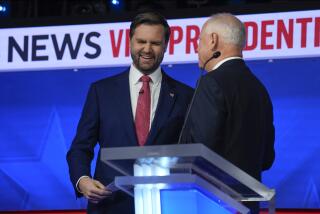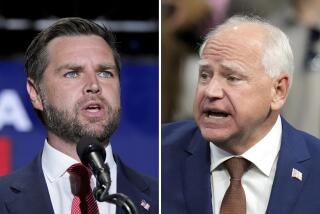Attacks Continue in Final Debate : Bush, Dukakis Conflict Sharply on Death Penalty, Tax Increases
- Share via
If the American voters were hoping for a break from the negative tone of the presidential campaign, they did not get it Thursday night as Democrat Michael S. Dukakis and Republican George Bush continued their attacks in their final debate, held in Los Angeles.
“The vice president wants to give the wealthiest 1% of the people a $5 billion tax break and we’re going to pay for it,” Dukakis said, referring to Bush’s desire to reduce the capital gains tax. “If we continue with these policies . . . I’m worried about the next generation, whether we can ever turn this around.”
Bush attacked Dukakis for “running on the left in the Democratic primary. He ran on his record . . . He’s the one who described himself as a progressive liberal. I’m not going to let Dukakis go through the election without explaining his liberal positions.”
Opposes Labels
Dukakis appeared to make an attempt early on to turn the campaign toward the positive, saying, “Let’s stop labeling each other and get to the future of this country.”
Bush later also struck a positive note, praising the “concept of Dukakis family” that he saw at the Democratic convention in July.
“The way he took understandable pride in his heritage, what his family means to him . . . I would say the Dukakis family has my great respect,” he said.
Bush added, talking to the journalists on the panel, “Any man who gets into this political arena and faces you guys every day deserves a word of praise because it has gotten a little ugly out there, it’s gotten nasty.”
But the vice president also said that it was at the Democratic convention that the Democrats began the attacks.
He also referred to a Dukakis statement in the summer about some former officials of the Reagan Administration who had been indicted:
“I’m not the one who compared the President of the United States to rotting like a dead fish from the head down,” Bush said.
Each candidate was hit on his most vulnerable area in the opening questions from CNN anchor Bernard Shaw.
Dukakis was asked if he would support the death penalty if his wife, Kitty, were raped and murdered.
The Massachusetts governor said he would not, arguing that capital punishment is not a deterrent to crime and then stating in detail how he wanted to “end this phony war on drugs and start a real war on drugs and crime.”
Bush was asked if he thought his controversial vice presidential choice, Dan Quayle, would be up to the job of President if Bush died before he was able to take office in January.
He restated his confidence in Quayle and implied that the media had been unfair to Quayle, who he said had taken “an unfair pounding.”
Dukakis retorted: “The vice president said watch my choice for vice president. It will tell all. And it sure did, it sure did. . . . I picked Lloyd Bentsen because I thought he was the qualified person for the job.”
Dukakis also got a chance early to address what could be the most troubling problem for him--the perception that voters don’t find him likable even as they admire his intellect.
He replied: “I think I’m a reasonably likable guy . . . but the presidency of the United States is a serious office. . . . It’s important choices.”
Dukakis then used the rest of his time on that answer to attack Bush again on taxes, saying that Bush’s pledge to never raise taxes was “not realistic. That pledge isn’t realistic. I think the vice president knows it and I think the people of this country know it.”
While Republican strategists said earlier Thursday that Bush mainly had to avoid a gaffe in the debate to maintain his lead in national opinion polls, the situation for Dukakis was much different.
For him the stakes were larger: He had to get through to voters in a way that he has been unable to so far, if the polls are correct.
In an interview in Los Angeles on Thursday, Democratic National Chairman Paul G. Kirk Jr. said: “There are four weeks left in this campaign and the American people have this debate to take a final measure of these guys. It is a chance for Michael Dukakis to talk about his vision of the future in a way that people can relate to.”
Dukakis not only had to present a positive case for his candidacy, he also had to try to get behind him two issues that appear to have hurt him during Bush’s aggressive attacks in recent weeks.
One is that Dukakis is soft on crime, a charge stemming from a furlough program in Massachusetts that once allowed convicted murderers to get weekend passes. One of those prisoners, Willie Horton, left the state and attacked a Maryland couple in 1986.
Dukakis later banned the furlough for such prisoners but Bush has used the incident effectively to polarize the race and paint Dukakis as a liberal.
So concerned were the Dukakis advisers about the furlough issue that they were still trying to cope with it Thursday, hours before the debate.
One of the campaign’s volunteers, Dan Heinerfeld, called the Los Angeles Times on Thursday afternoon seeking any information about federal furlough participants under the Reagan Administration “who went on to commit a violent crime.”
“We’re looking frantically to see if we can come up with something to counter the Massachusetts furlough thing,” Heinerfeld said.
The other issue dogging Dukakis has been a surprise: the environment. It was supposed to be a Dukakis trump card because of actions and appointments in the Reagan-Bush Administration that infuriated environmentalists.
But Bush put Dukakis on the defensive early by running a TV ad charging that the Massachusetts governor had been slow to start cleaning up Boston Harbor.
Dukakis countercharged that the Reagan Administration’s cutbacks in the Clean Water Act had been a major part of the problem.
Given the perception that Dukakis has been struggling, Kirk said Thursday the candidate would have a particularly crucial audience for the debate--Democratic senators and congressmen who are getting ready to leave Washington go home to their states “and beat the bushes for Michael Dukakis.”
To make their effort easier, Kirk indicated, Dukakis needed a clear win on the order of what Democratic vice presidential nominee Lloyd Bentsen achieved last week against Republican vice presidential candidate Dan Quayle.
Contributing to this story were staff writers Rose Marie Turk and Patt Morrison in Los Angeles and Douglas Jehl with the Bentsen campaign in Washington.
More to Read
Get the L.A. Times Politics newsletter
Deeply reported insights into legislation, politics and policy from Sacramento, Washington and beyond. In your inbox twice per week.
You may occasionally receive promotional content from the Los Angeles Times.










